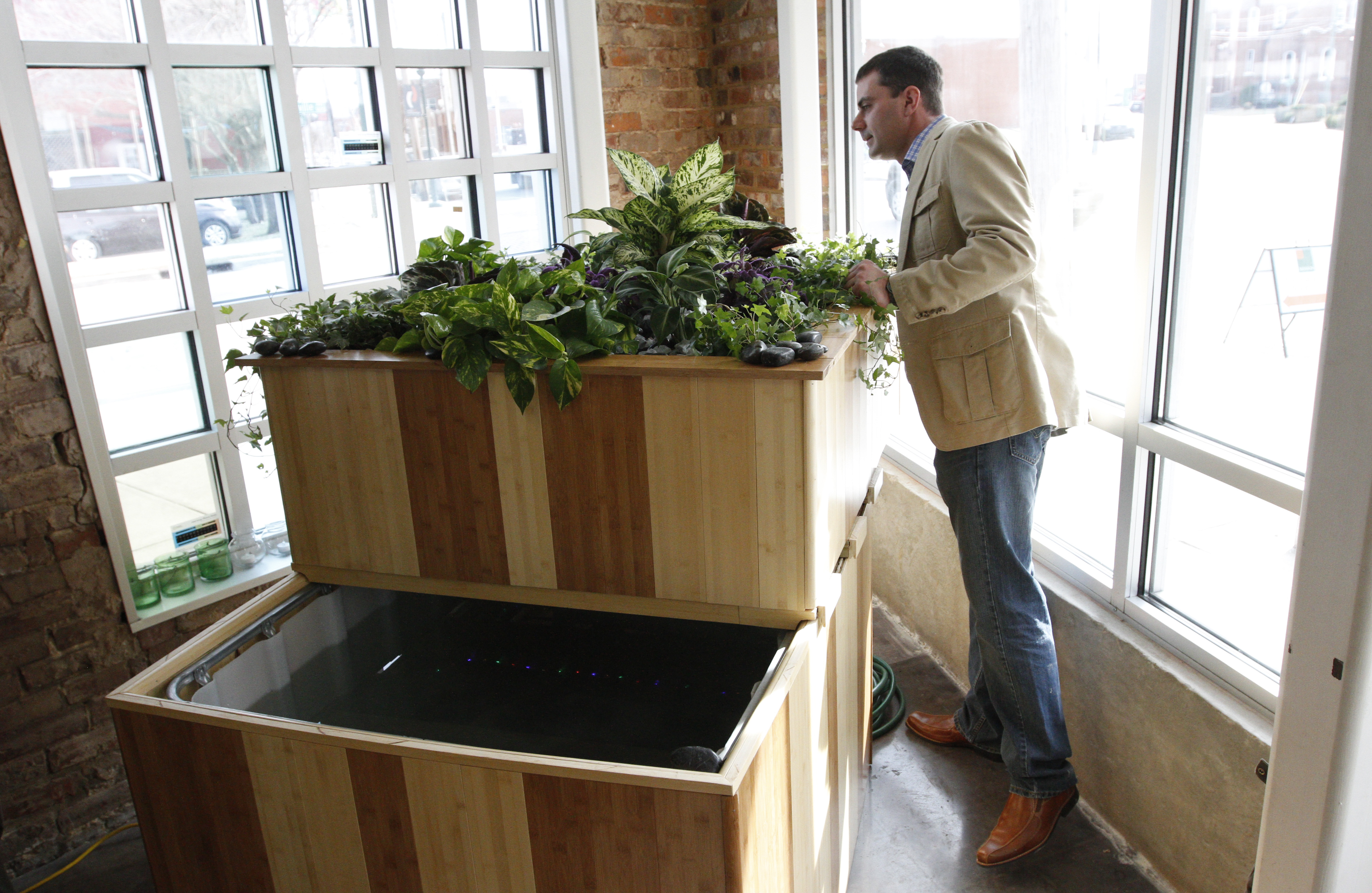Fish farm in a box provides fresh food grown at home
Friday, January 10, 2014
A Rossville, Ga., aquaponics company has launched a new product that will allow individuals to grow fish and vegetables to feed a family of four - all from a four by six foot farm-in-a-box that plugs into the wall.
HATPonics debuted its residential aquaponics system at Green Spaces in Chattanooga to a group of about 40 interested people and walked away with seven orders, CEO Ryan Cox said.
The system includes both a fish tank and a vegetable garden. The two parts are set up in a balanced, self-sustaining ecosystem -- the fish fertilize the plants, while the plants filter the fish waste out of the water. A family could grow cucumbers, tomatoes, peppers and lettuce in the top half of the system while raising tilapia, trout or catfish on the bottom half.
A fully-functional system will produce at least four salads a day and about a fish-a-week, Cox said. The 200-gallon fish tank can fit between 30 and 50 fish, which take about nine months to mature from fingernail-sized to 1 pound.
"This is so people can start taking control of their own food supply," he said. "A family wouldn't eat purely off of this, but it would supplement their food and eliminate the need to purchase fresh produce daily from a grocery store."
Chattanooga resident Candy Lusk thinks the the system -- which can run either on solar or electric power -- sounds like a good fit for her lifestyle.
"Grocery stores are getting expensive, and I prefer organic," she said. "I have a garden, but this uses less water and seems to be lower maintenance, and you don't have animals or pests eating the plants."
HATponics' residential system can be set up either inside or outside, Cox said. Each farm requires about the same amount of sunlight as a typical backyard garden, although artificial lights allow the systems to grow almost anywhere -- including basements and garages.
The new products retail for between $650 for a basic model and $2,000 for a model with all the bells and whistles, Cox said. Fish food may cost another $20 a year, he added. The farms are a micro-version of HATponics' $140,000 aquaponics farms, which hold about 3,100 fish and can feed as many as 500 people a week.
The company, which launched in 2013, hopes to feed 20 million people by 2020, Cox said. For every top-of-the-line residential system he sells, he'll donate one basic model to a family in an impoverished area.
"Whether we're helping in Nicaragua or right here at home in Chattanooga, our goal is to make sure people have access to food," Cox said. "That's the coolest part of what we do."
Aquaponics -- the practice of growing fish and vegetables together -- is gaining popularity across the nation, but is still an emerging and fairly complicated process, said Joel Houser, executive director at Crabtree Farms in Chattanooga.
"It's ambitious, and it's got to be a delicate system, because there are so many animals and plants in such a close proximity," he said. "It's kind of like a hot rod. If you can get it to work and run good, then you'll have food out of it."
But, he added, aquaponics can be tough. Because it is an interconnected system, one problem can quickly ruin a whole crop. You've got to worry about the different nutrients that fish and plants require, he said, and carefully regulate variables like temperature.
"With a system like that, if the power fails, then you lose the fish," he said. "We're always a little more careful to try things when they involve animals as well. We want to be very careful about that."
But he hopes the residential systems will work and gain popularity.
"Because if they do, there will be a lot of food produced on a very small acreage," he said. "I sincerely hope they can do it."
As demand grows, Cox hopes to keep selling the residential products directly to consumers, and is developing distribution channels.
HATponics employs 10 people and manufactures the farms out of a Rossville facility.
Contact staff writer Shelly Bradbury at 423-757-6525 or sbradbury@timesfreepress.com.

